

Ukhls briefingnote covid homeschool final. September, ‘robust remote learning contingency plans’ and the wisdom of trolls – Walden Education (@WaldenKent) How recent experiences of remote teaching; the observations of a US Sociologist; and (most importantly) Grand Pabbie Troll’s homespun wisdom* are steering my first steps in September and contingency planning for the Autumn.
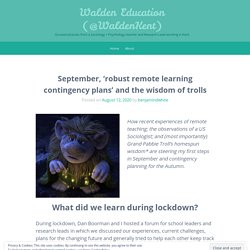
What did we learn during lockdown? During lockdown, Dan Boorman and I hosted a forum for school leaders and research leads in which we discussed our experiences, current challenges, plans for the changing future and generally tried to help each other keep track of DfE guidance docs. There is a case to be made that our first forays into remote learning were driven by the needs of teachers, not students!
They were not centrally ‘designed’ so much as they emerged. This emergence largely aligned with our need as teachers to dispense with our duties in a domain with which we had limited prior experience. After a while, in each school, most departments established a routine. Some employed video lessons. As a teacher myself I’m aware that we generally mean well (!) The Hidden Lives of Online Learners – Walden Education (@WaldenKent) Nuthall, in the Hidden Lives of Learners exposed the diversity of experiences and learning – between students in the same physical classroom.
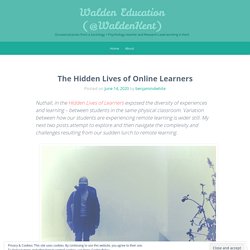
Variation between how our students are experiencing remote learning is wider still. My next two posts attempt to explore and then navigate the complexity and challenges resulting from our sudden lurch to remote learning. Mohammed, his school reports state, is a ‘highly-capable hard working and conscientious student’. Reasons to be cautious about lockdown learning loss estimates. Research estimating lockdown learning loss, published during the crisis, paints a grim picture of widening attainment gaps and long-term effects.
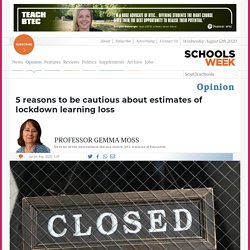
But how robust are the findings? There are reasons to treat with care the reports put into the public domain so far. 1. Much of the research remains speculative. DfE Guidance for Full Opening – What the Remote Learning Guidance Actually Means For Schools – The Ed Tech School. As is the case with most senior leaders in schools, I have been reading through the DfE’s Guidance for Full Opening since its publication on Thursday 2nd July.
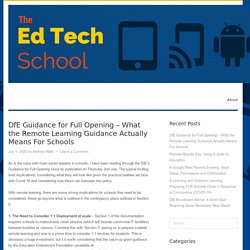
The typical mulling over implications, considering what they will look like given the practical realities we face with Covid-19 and considering how these can translate into policy. With remote learning, there are some strong implications for schools that need to be considered, these go beyond what is outlined in the contingency plans outlined in Section 5.
KS1 & 2 (ages 5-11+) Noel Fielding's Art Club twitter.com/noelfielding11 and @FieldmiceArt.
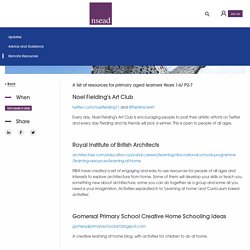
The #1 problem/weakness in teaching and how to address it. I see a lot of lessons – hundreds of them in multiple contexts – and I’m going to suggest that there is one very common challenge that teachers face that is often not addressed well enough, even by experienced teachers.
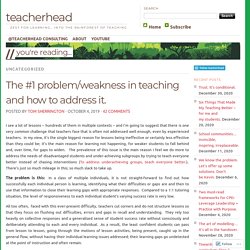
In my view, it’s the single biggest reason for lessons being ineffective or certainly less effective than they could be; it’s the main reason for learning not happening, for weaker students to fall behind and, over time, for gaps to widen. The prevalence of this issue is the main reason I feel we do more to address the needs of disadvantaged students and under-achieving subgroups by trying to teach everyone better instead of chasing interventions (To address underachieving groups, teach everyone better.).
See it from their perspective! I’ve been moved to write this post due to the ongoing struggles of my son regarding remote learning and hopefully use this to challenge teachers to think more carefully about the work and resources posted on platforms such as Google Classroom and Microsoft Teams at this time.
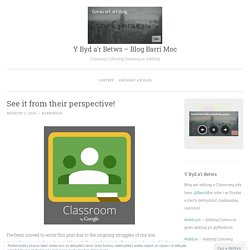
My son’s experience has been mixed and it’s clear that there is a range of expertise regarding remote learning and setting work in all schools and the quality and quantity varies from subject to subject. It’s obviously come as a shock to many teachers to find themselves in a position where they have to wrestle not only with subject content but also with learning how to use edtech platforms and apps at an incredible rate, despite the DCF being in place in Wales for some time. For many teachers it’s a new frontier and in order to satisfy the school requirements to set work this has led them to add links and resources they have to hand in order to meet the demand. Hoffi hwn: Hoffi Llwytho... Be Awesome, Go Big – Transition Resources for Year 6 Pupils. Stage 6 worksheets. Resources to help reduce disruption to students' learning - Mathematics Mastery. Getting started with Google Classroom. The Coronavirus pandemic has made teachers all over the world plan how they will approach distance teaching in the event of school closures.
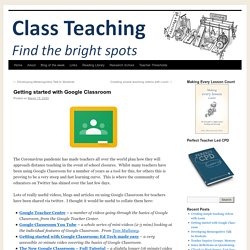
Whilst many teachers have been using Google Classroom for a number of years as a tool for this, for others this is proving to be a very steep and fast learning curve. This is where the community of educators on Twitter has shined over the last few days. Lots of really useful videos, blogs and articles on using Google Classroom for teachers have been shared via twitter. I thought it would be useful to collate them here: Google Teacher Centre – a number of videos going through the basics of Google Classroom, from the Google Teacher Center.Google Classroom You Tube – a whole series of mini-videos (2-3 mins) looking at the individual features of Google Classroom. Rosenshine Masterclass Captured. Free CPD! In response to demand for my workshops and masterclasses on Rosenshine’s Principles of Instruction, I’ve recorded a screen capture of me talking through the slides I use for my one-day events.
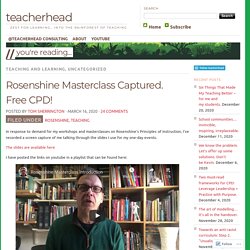
The slides are available here I have posted the links on youtube in a playlist that can be found here: There is 2 1/2 hours of material there so take your time to browse. If you would like to book me for in-school CPD please do – just follow the teacherhead-consulting tab at the top of this website. If you want bulk copies of the Rosenshine booklet email as@johncatt.com to discuss a discount offer.
Update: Video Booklets. I’m delighted that AHT, Claire Grimes, has made a superb workbook to go with each of these videos. Books are available for £3 each from You can contact as@johncatt.com for bulk discounts. You might also like to check back in with the Rosenshine blogs I’ve written and other related posts connected to the videos: Here is the session I did for ResearchEdHome with a focus on curriculum. Online, distance and home learning: Selected reading.
This selected reading list is one of three put together relating to the current COVID-19 outbreak.
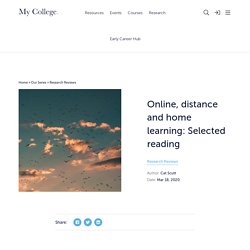
This list originally included a wider range of themes, but as the number of links increased it has now been split into three for easier navigation. CPD resources for school staff. Learn to love nature. The Big List of Children's Book Writers Doing Virtual Author Activities. With kids at home and parents looking for educational activities, many of our favorite authors are offering online read-alouds and activities on social media. We’ve rounded up over 50 of the best virtual author activities below! The RSPB Wildlife Charity: Nature Reserves & Wildlife Conservation.
Researchify. Free CPD Courses for Teachers. Richard Broad Head of UK Education @ Seneca Learning September 18, 2019 Seneca now offers seven free CPD courses to help teachers be better practitioners. Senecalearning. Summer Reading Challenge. The Great Indoors. Cloud recording. Overview Cloud recording is automatically enabled for all paid subscribers. When you record a meeting and choose Record to the Cloud, the video, audio, and chat text are recorded in the Zoom cloud.
The recording files can be downloaded to a computer or streamed from a browser. Note: You can also start cloud recordings on iOS and Android. Online, distance and home learning: Selected reading. Online, distance and home learning: Selected reading. The challenge of remote teaching is the challenge of all teaching - Daisy Christodoulou.
The challenge of remote teaching is the challenge of all teaching: learning is invisible. How do you get students to understand complex material, and how do you know when they have understood it? You need to check for understanding, and this is why – rightly – so much educational ink has been spilt on the topic of checking for understanding, or formative assessment, or responsive teaching, or whatever phrase you prefer. As all these phrases make clear, the challenge is one of interactivity. A traditional classroom provides interactivity by having a teacher who can ask and answer questions. One of the most effective teaching methods is whole-class direct instruction, a highly interactive form of teaching which involves lots of call and response, incredibly frequent feedback and in some cases can pretty much resemble a live performance.
Mastering Remote Teaching- Intro: Two types of Learning - Teach Like a Champion. As you probably know, watching video of teachers in action and sharing bright spots is what my team and I love to do. And while everything has changed in terms of what teachers are being asked to do, we think it’s still helpful to see peers in action and borrow ideas. Free home learning resources during Coronavirus school closures - English Mastery.
Oak National Academy. Assessment and feedback in an online context: Peer assessment. Just as with self assessment, it is important to provide pupils with clear worked examples and success criteria for peer assessment so they know what they should be paying attention to in their partner’s answers. Pupils can then review their partner’s work against the success criteria and use the worked example to figure out which areas require further improvement. What makes a good flashcard? - Daisy Christodoulou. What makes a good flashcard? Keep it really simple. New evaluation reports: catch-up programme boosts young children’s language skills by +3 months.
A catch-up programme to improve the language skills of 4-5 year-olds who are falling behind has been found to boost their progress by three additional months, according to the results from an independent evaluation published by the Education Endowment Foundation (EEF) today. 193 schools across England took part in this trial of the Nuffield Early Language Intervention (NELI), a programme published by Oxford University Press and delivered by the University of Oxford in partnership with Elklan.
Teaching assistants were given 2 ½ days of training and detailed lesson plans so they could lead short, structured sessions, often around everyday topics, such as ‘time’ and ‘what we wear’, with small groups of reception-age pupils. Rewarding the children was an integral feature of each session, from targeted verbal praise to more formal incentives like a ‘Best Listener Award’, given to a child who had listened well in the group.
Completed projects.